Software > Office Applications
Comparing web office products
By Lasa Information Systems Team
Miles Maier takes a look at how the various tools you might use to start your own ‘web office’ compare.
In part one of this article, we looked at getting started with using online tools to carry out everyday tasks such as email, calendar and contacts. We looked at what online tools are, the pros and cons, and how using these tools can help you to collaborate, share and publish work with colleagues
In part two, we now look at comparing the various tools you might use to start your own ‘web office’
DISCLAIMER: The opinions in this article are solely those of the London Regional Champion. We do not advocate any one web service tool over another and this article is purely intended as a guide to help you begin your own experiments with online tools.
Email:
Breaking the habit of using Outlook for email can be difficult. However, Google’s Gmail service offers lots of functionality and integrates well with other Google services, such as Google Calendar, Maps, and Mobile, and it’s easy to forward emails from an Outlook account to GMail.
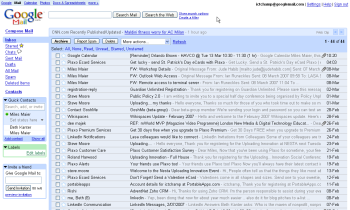
View larger Google mail image (opens in new window)
Advantages: No doubt about it - Google’s free Gmail service offers the best combination of features, functionality, integration and storage to be found in an online mail service. With 2GB of storage, Google integrates tightly with its other offerings - Google Calendar, Mobile and Maps. The launch of Google's free Mail Fetcher (see below) also allows users to bring mail from external email accounts (like Yahoo!) into their Gmail (which Yahoo! and Microsoft currently charge for as a premium service).
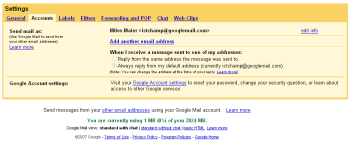
View larger Google Fetcher image (opens in new window)
Basic integration with Outlook email was fairly easy with the creation of a simple rule in Outlook to forward my mail to GMail. However, you should always check with your IT administrator as many organisations consider the redirecting of company mail onto third party servers to be breach of security.
We've also heard on the grapevine that many businesses are seriously considering taking up Google's Premium Apps service.
Disadvantages: Apart from the usual caveats about security and data back-up of hosting your precious data with a third party provider in a different legal jurisdiction from the UK, GMail's major weakness is the lack of functionality -
many will be tempted to use an alternative service like Plaxo.
See: Google Mail
Calendar:
Google Calendar is a fully featured web calendar that integrates well with other Google services, such as GMail and Google Maps.
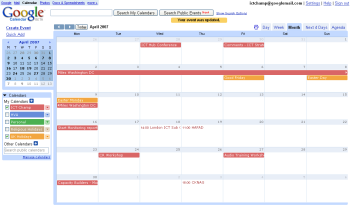
View larger Google Calendar image (opens in new window)
Advantages: Using Google Calendar you can create and share multiple calendars and set up reminders and auto responders – this is useful if you need to co-ordinate a small team of workers who either work from home or spend most of their time doing outreach work.
A Microsoft Outlook calendar can be imported into Google as a CSV file and SyncMyCal can be used to synchronise appointments between Google and Outlook. For Mac users, SpanningSync will synchronise between Google Calendar and Apple’s iCal.
See: Google Calendar
Address Book/Contacts:
Plaxo is a popular web based address book with a large number of other users, an important factor in choosing any online tool if you plan to use it long-term.
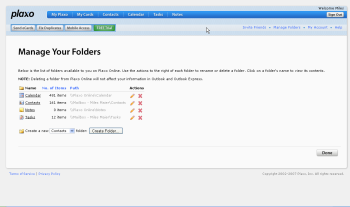
View larger Plaxo image (opens in new window)
Advantages: Plaxo strength is its integration with Outlook.offers better functionality than the contact management in Google’s Gmail. You can download a free toolbar from Plaxo which will automatically synchronise with Outlook contacts, notes and tasks. Premium versions of Plaxo will also synchronise contacts with your mobile phone or PDA.
Disadvantages: Plaxo’s major weakness is that it whilst it offers the best contact management, it doesn’t yet offer support for email, documents or spreadsheets. We expect Plaxo to fix this in the near future by partnering with an email service provider.
See: Plaxo
Word processing and spreadsheets:
ThinkFree Online Edition:
During testing, ThinkFree Online Edition emerged as my current choice of word processor and spreadsheet tool because of its focus on delivering a tightly integrated set of word processing and spreadsheet tools.
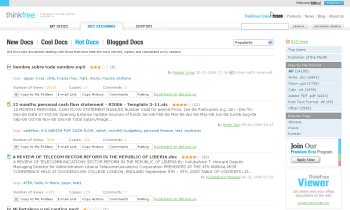
View larger Thinkfree image (opens in new window)
Advantages: ThinkFree Online edition delivers the fastest editing speeds of the three tools tested in this section. It handles large and complex documents and can work whilst you’re not on the Internet - important if you need to work in areas without an Internet connection. It also has a familiar user interface that borrows heavily from Word and Excel.
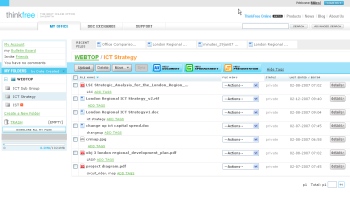
View larger Thinkfree editor image (opens in new window)
ThinkFree also boasts a doc exchange area where users can upload and share their files – typically templates and other useful files.
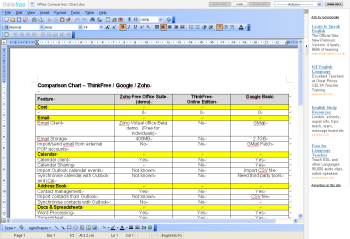
View larger Thinkfree document image (opens in new window)
Disadvantages: On the downsideThinkFree appears to be the only one not to currently support Open Office file formats (opd, ops, sxw). Another slight downside is ThinkFree’s lack of integration with email, calendar and address book services to form a complete office suite under one banner. However, ThinkFree does seem to be looking at this and we could well see these missing services emerge in ThinkFree during the near future.
See: Thinkfree
Zoho Writer and Zoho Sheet:
If I had to choose a provider for an integrated suite of productivity tools, it would be Zoho. Zoho offers a rapidly expanding suite of free and paid for online office tools such as a web notebook, wiki, polls, project manager, customer relationship management (CRM), and database tools.
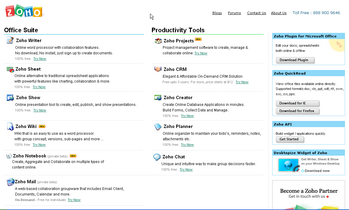
View larger Zoho image (opens in new window)
For our web office, Zoho Writer and Sheet is a well supported free online word processor and spreadsheet service.
Advantages: It has a clean, simple interface familiar to users of Word and Excel. Zoho also offers the ability to share and publish documents, and can import and export to a wide range of file formats, including Open Office. Zoho also offers offline working via a plug-in for Microsoft Office.
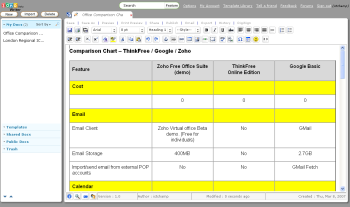
View larger Zoho document image (opens in new window)
As with ThinkFree, you can also post directly from Zoho to your blog of choice. Zoho Writer and Zoho Sheet also gives you extra storage capacity by integrating with online storage company Box.net, which offers 1GB of free storage.
Disadvantages: On the downside, many users have noted that whilst it accurately displays simple Word documents imported into Zoho Writer, it tends to slow down and struggle with more complex documents, such as the 47 page ICT Strategy I’m currently writing. In fairness to Zoho, the company acknowledges this and is working on improving its speed.
Future developments: As a sign of things to come, Zoho will also be partnering with EchoSign - which will allow users to send and receive digitally signed invoices and receipts, a small step towards enabling e-commerce into your ‘web office’. Zoho has also been trialling a web office portal that will bring email, calendar, contacts, documents and spreadsheets under one roof.
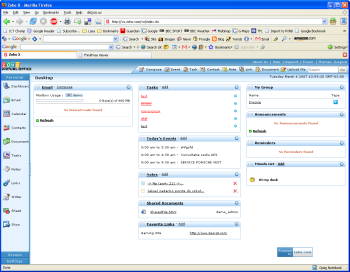
View larger Zoho Virtual Office image (opens in new window)
See: Zoho
Google Docs & Spreadsheets:
If it’s integration with email, calendar and contacts you’re after - Google Docs & Spreadsheets is the one.
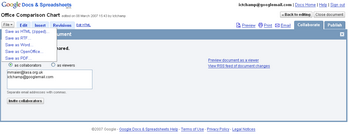
View larger Google Share documents image (opens in new window)
Advantages: Whilst this service has rather basic document formatting options, it makes collaboration and sharing easy through integration with GMail. This probably the choice to make if you want to collborate on rough drafts or outlines without worrying about a polished final look. Google Docs & Spreadheets also supports a wide range of file formats, including Word and Open Office
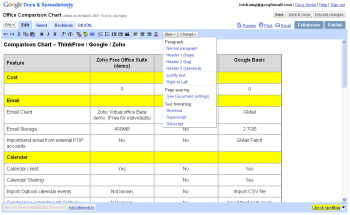
View larger Google document image (opens in new window)
Disadvantages: However, Google Docs and Spreadsheets has the most basic word processing and spreadsheet functions and the lowest file size capacity of the ‘free’ services reviewed - and is probably not the choice to make if you want to collaborate on large, complex business documents.
See: Google documents
Accessibility
At present none of the Web Office Products offer accessibility options. This is something that needs to be developed if these tools are ever to truly replace traditional Office products.
What’s next for the web office?
One thing that’s clearly missing from all three services is that staple of office life - the mail-merge of text documents and address book contacts to create letters and labels. This may well change in the near future as all three services look to offer an integrated package of calendar, email, and contacts along with document and spreadsheet editors.
Remember with all these tools, sustainability is a big issue – what happens to your documents and data if the company is no longer around? Make sure you pick a tool from a company that’s likely to stay the course. And make sure you keep a backup of your documents somewhere else.
Download our Web Office Tools comparison chart (PDF Document 39Kb).
About the author
Lasa Information Systems Team
Lasa's Information Systems Team provides a range of services to third sector organisations including ICT Health Checks and consulting on the best application of technology in your organisation.
Lasa IST maintains the knowledgebase.
Follow us on Twitter @LasaICT
Glossary
Backup, Blog, CSV, Database, Hosting, ICT, Internet, MAC, Mobile, Mobile phone, PDA, PDF, Processor, Spreadsheet, Storage, Wiki
Related articles
Published: 15th March 2007
Copyright © 2007 Lasa Information Systems Team
 This work is licensed under a Creative Commons Attribution-NonCommercial-NoDerivs 2.0 UK: England & Wales License.
This work is licensed under a Creative Commons Attribution-NonCommercial-NoDerivs 2.0 UK: England & Wales License.
